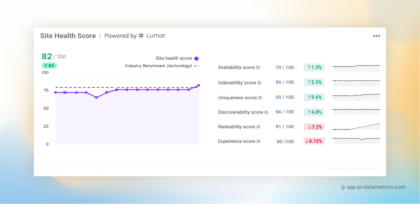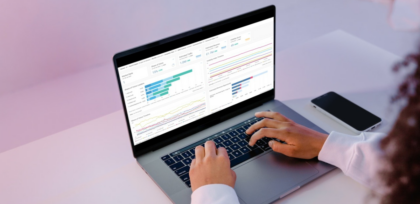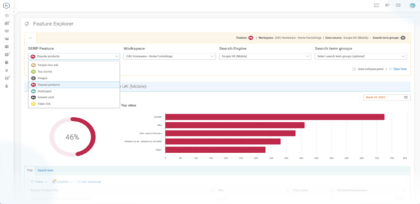Argos and Google Home: Just how valuable is voice shopping?
18 Sep 2018|3 MIN READ
Argos is now an official voice shopping retailer. How will this affect their organic search visibility? And how valuable is it for retailers to have a voice shopping strategy?
UK home and electricals retailer, Argos, has announced its new voice shopping service, enabling consumers to reserve 20,000 products in local stores using their Google Home smart speakers.
The digital assistant and voice shopping market is forecast to be worth £3.5 billion in the UK by 2022, and sales of smart speakers have grown 151% YoY in Argos alone.
Argos’ announcement comes just in time for the biggest retail holiday seasons: Black Friday and Christmas.
What does this move mean for Argos’ organic visibility?
Looking at Pi Market Intelligence share of voice snapshot, across thousands of the most well-optimised sites in the organic search Electricals market, we can see that Argos is currently reigning supreme with a 7.43% share of voice; outperforming brands like Apple and Currys.
As interest builds around voice search shopping, retailers considering this strategy need to ensure they maintain strong organic visibility, to be present for consumers researching their products in the lead up to making a purchase.
[icon-cta-banner colour='jazzberry-jam' headline="See your share of voice with Pi Market Intelligence" icon='/wp-content/uploads/2018/04/icon-software-1.svg' cta_action='/sign-up-for-a-demo/' cta_text='Book your demo']
Being first to market is Argos’ biggest advantage
Argos is the only UK retailer to offer voice search shopping. Being first to market means they will be the go-to retailer for early-adopters.
As a result, they won’t have to stave off competition, and can re-invest saved time into honing their voice shopping experience.
But voice search shopping is still in its infancy, and there are issues to be ironed out. Take Amazon Alexa’s shopping experience as an example:
- “Even though Amazon has sold millions of Echo speakers, analysts say few people use them to buy products.”
- Only 2% of Alexa owners make a purchase using their voice
Voice search shopping: Research vs. purchase
With the arrival of voice search shopping, it’s unlikely that we will forego browsing products and reviews, to spend more time buying - and Argos realise this.
"This launch is step one and I don't expect to turn on the app and suddenly double our sales," says Argos’ Chief Executive, John Rogers.
The retailer still requires shoppers to browse their catalogue or website to find the product they want before asking Google Home to make reservations.
As it stands, voice search shopping is likely more of a novel way for already loyal and informed customers to purchase, replenish and replace products.
How should retailers develop their voice search shopping strategies?
To capture the attention of new customers, retailers will need to devise ways to enable not just frictionless purchasing, but frictionless researching.
Until they can provide a frictionless research experience on a Google Home smart device, customers will still primarily be researching online in organic search.
Argos’ organic visibility is therefore more important now than it’s ever been.
[icon-cta-banner colour='jazzberry-jam' headline="Optimise for voice search with PiMarket Intelligence" icon='/wp-content/uploads/2018/04/icon-software-1.svg' cta_action='/sign-up-for-a-demo/' cta_text='Book your demo']
A shrewd move: Argos chooses Google Home over Alexa
There are three million Amazon Alexa devices in the UK, but Argos has chosen to partner with Google Home.
Why?
Because, while Google may not have as much presence in the home, they have both iOS and Android apps.
Argos have realised that while 55% of shoppers enjoy purchasing through voice-activated devices, in this transitionary phase, the majority of people don’t yet have a voice-enabled device - but they do have access to the Argos app.
“The fact that this work’s on Google Home is a great headline-grabber, but this is actually a mobile play.” says Paul Skeldon, Editor at Internet Retailing
With this in mind, brand awareness is likely the main motivation for developing a voice search shopping strategy.
And, with the influx of interest expected after the announcement, Argos have undoubtedly reinforced their positioning online in search, for consumers looking to check their inventory.
So, is a voice search shopping strategy worthwhile for retailers?
Being present in voice search shopping is undeniably valuable for PR and brand awareness. What’s more, being one of the first to market can enable retailers to capture the interest of early adopters and stay ahead of competition.
But, as explored above, the experience isn’t totally seamless yet, meaning more traditional forms of research and purchasing (i.e. organic search) are still highly relevant, if not essential for supporting a voice search shopping strategy.
Maintaining continuous presence in search, will enable retailers to test, iterate and define the experience to dominate the market as it grows.
Know organic search performance in your industry
See whether you’re best prepared for the research and interest phases brought about by voice search shopping; explore your brands’ search performance for thousands of the most commercially relevant searches in your market, with Pi Market Intelligence.
Get your demo today.
Never miss a post
Join our mailing list and have our SEO news delivered straight to your inbox.
Never miss a post
Join our mailing list and have our SEO news delivered straight to your inbox.





